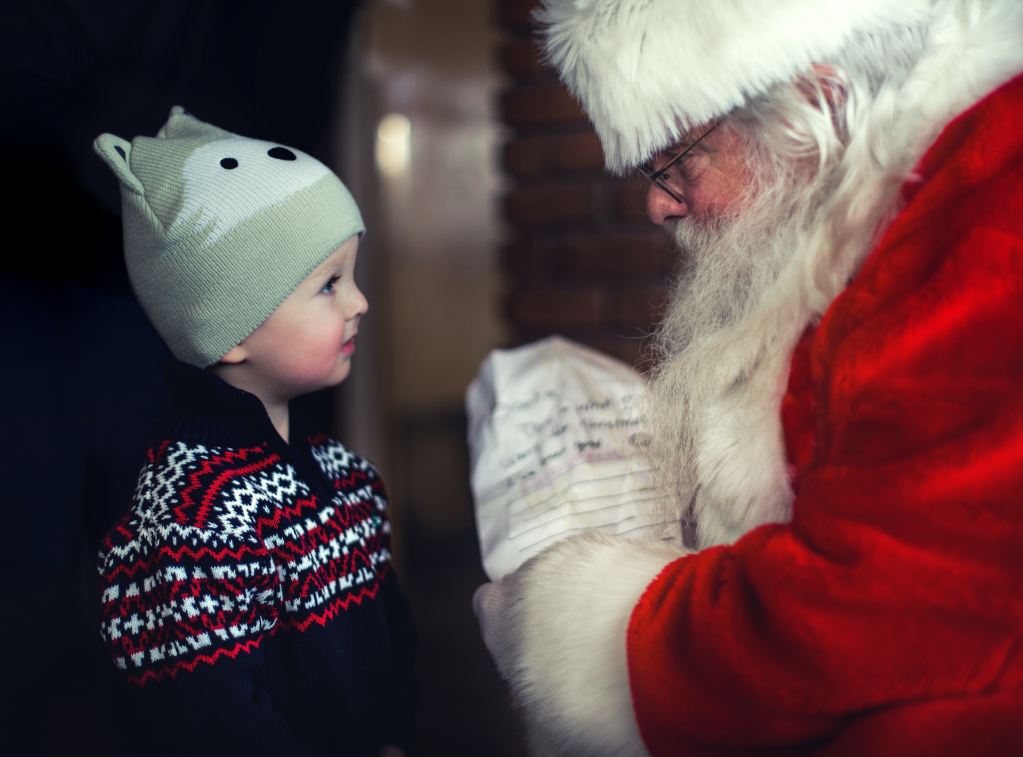
For many parents, part of the magic of Christmas is telling their children the many stories of Santa Claus. The tale of Jolly Old St. Nick is a time-honored tradition that has been around for generations. However, not everyone loves the idea of sharing the story of Santa Claus, only to eventually admit it was a lie told for years “in good fun,” which makes them question the need for disappointment and possible hurt feelings down the line.
If you’re a new parent or one with young children in the home, you may be debating whether you or your family will be taking part in the idea of Santa Claus, or simply questioning how you feel lying to your kids about Santa Claus.

Lying to kids about Santa: What is a lie?
Though there are many definitions by which the word lie can be defined, in this instance the Merriam-Webster dictionary describes it as “an assertion of something known or believed by the speaker or writer to be untrue with intent to deceive.” This is not to say that parents who tell their children the stories and traditions of Santa Claus are telling their children outright lies to deceive them maliciously, but simply to relay that a lie – by definition – is still a lie.
It’s important for parents to understand that most child development specialists, medical specialists, and therapists agree that the vast majority of children will not experience negative, long-term effects after learning the truth about Santa Claus. In a recent article in the Washington Post, the University of Texas at Austin child psychologist Jacqueline D. Woolley said, “There is no evidence that belief, and eventual disbelief in Santa, affects parental trust in any significant way. Furthermore, not only do children have the tools to ferret out the truth; but engaging with the Santa story may give them a chance to exercise these abilities.”

Getting on their level
Characters on television shows, in movies, in YouTube videos, and in books are some of the first introductions our kids have to the world of make-believe and imagination. As adults, we can all remember characters we loved as children, those favorite Disney movie princesses, or Star Wars’ Jedis fighting bad guys and saving the galaxies far, far away. However, once we reached a certain age, we all began to realize that those characters didn’t exist beyond the world of our televisions or storybooks. That being said, we’re not aware of many adults across the globe experiencing unrest with these companies’ characters lying to them about made-up storylines or non-existent planets that housed our favorite superheroes.
Rosemary Truglio, child development specialist and senior vice president of curriculum and content at the Sesame Workshop defends the idea that make-believe is part of every child’s life, no matter if they are furry animal characters or the big man in a red suit. “It’s during those early years, you know, up to age 7, that their world is filled with magic and imagination. You know, how many of us have had imaginary friends?” She goes on to say, “Everything is real. So even when you think about our characters — Elmo, and Abby, and Snuffleupagus and Big Bird — those characters are real to children. They live outside of the TV box.”

Make an informed and well-thought-out decision
The path parents choose to take in regard to Santa is one not taken lightly or without some research and thought. While there are pros and cons to both sides of the coin — keeping up with the tradition versus a more updated approach – the choice of Santa or no Santa, and what to include in your child’s yearly Christmas experience is ultimately the decision of the child’s parents or guardians.
There are fantastic and equally quaint and charming ways to include the man in the big red suit in your family’s home without laying too much pressure on the “lie” that could be “Santa’s Tall Tale.” For instance:
- Explain to your children that even though Santa brings them presents, parents must pay for them. This helps preserve the charm of having Santa bring children gifts, while still allowing parents the credit of supplying the financial end of the gifts. This method can make it a bit easier for kids to understand the truth behind Santa when they are older.
- Don’t designate which gifts come from Santa. Some families simply wrap gifts and place them under the tree, with tags placed only with the recipient’s name. The idea behind this method is that kids understand the gifts under the tree are theirs, but who gave them does not matter.

When do you tell your kids the truth?
If Santa is a part of your family tradition, there will no doubt come the point when a parent has to decide when to tell their kids the truth. Experts suggest that most kids begin to question whether Santa is real between the ages of 7 and 10, but how to approach a questioning child is different for every family. “There is no right or wrong answer,” Arianna Boddy, Psy.D., NCSP, a child clinical psychologist, explained to Parents. “You have to evaluate what works best for you and your family while considering your child’s maturity level and developmental age.” If your child asks you if Santa is real, ask them what they think and what they believe. Once you know how they feel about Santa, it might make your approach to the conversation easier.
Every family is different, and each one’s approach to the holidays is equally quite different. If you’re wondering what to do with the upcoming Christmas season, one terrific way to help you make your choice is to have a conversation with your support team, your family, or whoever helps you rear and raise your child. The old-fashioned saying plays true in this situation, and aids parents in having clear conversations about their desires for their child’s upbringing, while also leaning on the support of their team to help you talk through your options before making the big decision.
Editors' Recommendations
- Is your kid screaming for no reason? Here are ways to deal with a screaming child’s behavior
- What is a baby sprinkle (and how to plan a great one)
- 10 incredible baby shower food ideas that will wow your guests
- What is a nanny? How to hire the right nanny for your needs
- What age should children start wearing deodorant?




